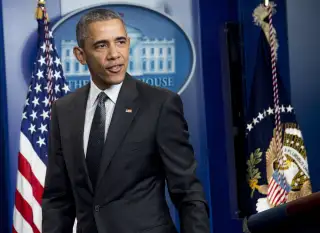What Really Happened to Your Taxes While Obama Was President

With Donald Trump and the Republicans set to take the reins of government, Washington's economic priorities are clear: Expect big tax cuts, especially for business owners and wealthy investors, in the name of invigorating economic growth. That's going to be a big contrast with President Obama and the Democrats, who put bigger emphasis on using tax policy to correct a wealth distribution they consider unfair.
But claims that Obama dramatically raised taxes -- as was frequently charged by his opponents -- were exaggerations designed to rile up the Republican base. While Obama did raise some taxes, mostly to pay for Obamacare, there was no major tax overhaul of the kind Trump and Republicans hope to accomplish. In fact, in 2013 Obama signed a compromise bill making permanent the tax cuts enacted by his Republican predecessor, George W. Bush.
As of 2013, the Tax Policy Center found that, under Obama, the top 1% of earners paid an effective federal tax rate of roughly 32%, compared to about 27% under Bush. But middle earners paid roughly 12%, almost exactly the same as under the previous president, while low earners paid a bit less -- about 2.3%, rather than 3.5%.
The tax changes under Obama basically fell into two buckets: Obamacare tax increases, and tax cut extensions.
Obamacare Tax Impact
What new taxes did take effect over the last eight years were largely related to the 2010 Affordable Care Act, designed to be 44th president's signature achievement. The ambitious goal of providing health care for all Americans required a slew of new taxes, both to help pay for new insurance subsidies and as prods for healthier behavior. When the right-leaning Americans for Tax Reform published "A Full List of Obama Tax Hikes," 19 of the 20 items were explicitly tied to Obamacare. (The remaining item -- a hike in excise taxes on tobacco -- was tied to health policy.)
The largest of the new taxes, which was projected to raise $123 billion over a decade, was a 2.3% surtax on investment income -- capital gains and dividends -- owed by households making at least $250,000 or individuals earning $200,000. Other big-ticket items include a 0.9% increase in the Medicare payroll tax on the same group of high earners (forecast to raise $86 billion over 10 years) and the much-derided Obamcare individual mandate -- a new $695 to $2,085 penalty owed by anyone who doesn't buy a health plan (forecast to to raise $65 billion, in conjunction with similar employer penalties).
Both the Obamacare mandate and the tobacco excise tax have been singled out as hitting the middle class. This is technically true, but not the whole story, since both are designed around shaping behavior, rather than raising revenue. While the fate of Obamacare itself remains unclear, early research suggests the tobacco tax has been at least partly successful at reducing use.
Bush Tax Cuts Preserved
Outside of health care, meanwhile, Obama's tax legacy is largely one of preserving George W. Bush's lower rates, at least for the middle class. The American Taxpayer Relief Act, which Obama signed into law as part of a "fiscal cliff" budget deal in January 2013, made roughly $2.8 trillion of Bush's expiring $3.4 trillion tax cuts permanent, according the the left-leaning Center on Budget and Policy Priorities.
The law preserved lower, Bush-era income-tax brackets, with a top rate of 35% for taxpayers earning less than $400,000 and couples earning less than $450,000. The deal also made permanent the $1,000 child tax credit, up from $500, and the elimination of the so-called "marriage penalty" by allowing couples to take a standard deduction that was twice the size of the one available for singles. Meanwhile the estate tax -- a favorite of liberals and a longtime target of conservatives -- was pegged at 40%, with estates of less than about $5 million exempt. (Without the legislative fix that Obama signed, the top estate tax rate had been set to rise to 55%, and kick in on estates worth more than $1 million.)
While the law didn't receive universal Republican support, it grabbed votes from the Republicans likely to serve as key players in any upcoming Trump administration tax reform, including current House speaker Paul Ryan and current Ways and Means Chairmen Kevin Brady.
“After more than a decade of criticizing these tax cuts,” said then House Ways and Means Chairman, Dave Camp in 2013, “Democrats are finally joining Republicans in making them permanent. Republicans and the American people are getting something really important, permanent tax relief.”